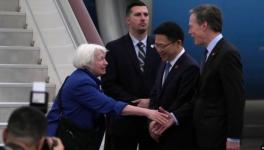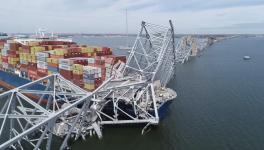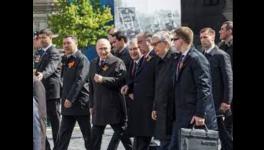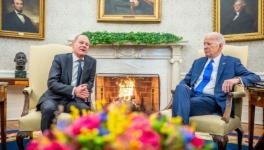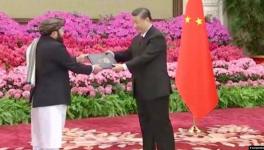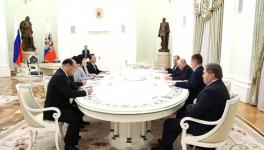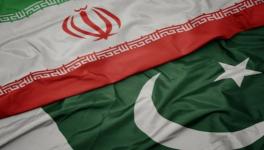Korean Peninsula in Historic Peace Talks - Thanks to Activists, Not Trump
Biography
Dr. Simone Chun has taught at Northeastern University in Boston, and served as an associate in research at Harvard University's Korea Institute. She is an active member of the Korea Peace Network, and a member of the steering committee of the Alliance of Scholars Concerned about Korea.
Transcript
BEN NORTON: It's the Real News. I'm Ben Norton. After six decades of conflict, it looks like the war on the Korean peninsula may finally be coming to an end. Since the early 1950s, South and North Korea have technically been at war with each other. From 1950-1953 the United States waged a devastating war on North Korea in which the U.S. killed some 3 million people, 20 percent of the nation's population. The U.S. burned most of the country's major cities to the ground. After this U.S.-led war, South and North Korea never signed a peace treaty, which means generations of Koreans on both sides of the demilitarized zone have grown up in a perpetual state of war.
Well, now that all appears to be changing. South Korean officials confirmed this week that they are in talks with North Korean officials and are considering drafting a peace treaty for the first time. Joining us to discuss this historic development is Simone Chun. Simone has taught at Northeastern University, and served as an associate in research at Harvard University's Korean center, Korea Institute. She is an active member of the Korea Peace Network and is on the steering committee of the Alliance of Scholars Concerned About Korea. Thanks for joining us , Simone.
SIMONE CHUN: Thanks for having me.
BEN NORTON: So first of all, can you just react to this historic news? I think a lot of people don't understand how important this is, that after six decades of what is technically still a war, an ongoing war, it look Like there may finally be a possibility of a peace treaty.
SIMONE CHUN: Of course this is truly a historic and exciting moment. And you know, I was, I was born and raised and I got my education, until I got into graduate school, in Korea. And I'm part of the generation in Korea who was born in a divided Korea. I've never known, you know, a Korea that was unified. So this is a truly historic moment. And responding to the news that is about the possibility of the two Koreas making political declaration , ending the Korean War. This is truly a moment that we have, we have been waiting.
Nevertheless, I must point out that the real major issue is that relations between the United States and North Korea still, because the reason why there has, there has been no peace treaty has been the United States sort of, has opposition to this major, major, making permanent peace on the Korean peninsula. So what two Koreas trying to do right now is to remove that barrier, that hindrance, and having the very first sort of steps toward that peace treaty. That means that are going to have a political declaration that says, you know, although South Korea is not, was not part of that, that armistice signed in 1953, as you recall the armistice was signed between, among North Korea, China, and the United States. So in order for the real peace treaty to be signed, the signatories of those two nations should come to agreement. Signatures of armistice should come to table a make a final declaration to end the war.
But in order for that to happen, both Korea have now made it an initiative to make a step by step approach. First, a political declaration of the two Koreas ending the enmity. And the second step will most likely be either 3-way or 4-way a political declaration among the United States and two Koreas, and possibly China. And eventually the peace treaty. And what that means is that finally we will have basically the three pillars of a permanent peace regime. Obviously if it's successful for political diplomatic normalization between two Koreas. And also most importantly United States and North Korea, and United States having embassy in Pyongyang, possibly. And the second will be that, you know, really normalization process, interaction, engagement in all levels, economic, social, political, cultural levels between two Koreas, and of North Korea with the other, rest of the world. And thirdly we also want it to address, you know, one of the second, another very important barrier, that is lifting economic sanctions, the harshest, the most oppressive U.N.-led and U.S.-led economic sanctions against the people in North Korea that are really preventing North Koreas to develop its economy, and also causing all kinds of humanitarian consequences.
And in Russia, this is a truly amazing development. And I think that obviously Donald Trump said that he, you know, he's absolutely getting credit , which is true. And also I think another most important point we have to remember is the President Jae-in, who was elected from the, after the powerful democratic movement, called the candlelight movement. He has taken very strong initiative and diplomacy, and also with, as you recall, the very successful Peongchang Winter Olympics, and of course, importantly, North Korea's Kim Jong-un's leadership. Unlike in the way that western media portrays, a crazy or mad man image, Kim Jong-un has been quite, especially since the beginning of this year, has been quite methodical and deliberate, and has been very, very proactive in making the commitment toward peace. So I think that if all goes well it will truly, this is probably the year that many of us will remember for the rest of our life. It is truly the moment of history making.
BEN NORTON: Well, we all hope so. It would be a great historic development, and of course it would be great for peace, not just for people in the Korean Peninsula, but for the world. You raised a few different points there, and I want to address a few of them. First, I think, as you mentioned, a lot of Americans aren't aware of the fact that there are still tens of thousands, more than 26000 U.S. troops in South Korea. North Korea says that in fact the South is militarily occupied by the U.S. Of course, you also mentioned the extremely brutal sanctions that have been imposed on North Korea. Of course, we've seen the effects of similar sanctions on Iraq in the 1990s, in which hundreds of thousands of children died because of those U.S.-led, U.N. sanctions. So clearly civilians often suffer because of this political pressure through sanctions.
So I'm curious, you did say that Trump has been claiming credit. And maybe he does deserve some credit, but I think you raised a more important point. I'm skeptical of the idea that Trump actually bears responsibility. What a lot of people in the U.S. media are ignoring is that, as you mentioned, there was a massive grassroots movement in South Korea. Not just a peace movement, but there was a movement that brought in a more liberal government under President Moon. And this is one of the first governments in decades that has actually been committed to rapprochement and peace on the peninsula. So can you talk a bit more about the protests, the grassroots movement, and how it led to a more left-wing government that was actually open to this possibility of peace in the South?
SIMONE CHUN: Indeed. We had an amazing candlelight protest, as you recall, here for almost a year. Almost every Saturday there was hundreds of thousands of Korean people who tried to contest the corrupt and very ultra-right wing Park Geun-hye government. And that required almost one out of four Koreans participated in the candlelight revolution. And the, even that candlelight revolution, as you remember, also activists both in South Korea and also United States had a form of solidarity. And which elected now the President Moon Jae-In. And the President Moon Jae-In was actually, he served in the previous l iberal government, that is, President resident Roh Moo-hyun, and he was chief of staff. And also he, President Moon Jae-in was actually the architect of the second stage of the sunshine policies, sunshine policy known as the north and south engagement policy, before these two consecutive right-wing government, Lee Myung-bak and Park Geun-hye government. And so which was, I think, as I point out earlier, without massive, massive support, mobilization, not only for peace and democracy, I really don't think that would have, we would be at this moment here in the history.
And I think that also North Korea, Kim Jong-un has been also obviously paying attention to the immense popular movement in Korea, and it empowers people. And in the past what you have in especially the North and South Korea relationship, it was all about the negotiations between the elite. And as you recall, the upcoming April 27 summit is a third summit. The previous two summits was more elite level. But this time I am really arguing that this, this moment is fundamentally different from previous ones in that this time we have enormous energy and a passion and mobilization and solidarity from people, not only in Korea, from elsewhere, to demand that we're going to make a permanent peace regime and peace system on the Korean peninsula.
So in a way this movement in particular is very different from other ones where in the past we would enter into agreement, once it's signed will quickly be abandoned as, say, you know, depending on which, who will become president. As you recall that even 2000, the first, current agreement was, you know, was signed, but then quickly abandoned as George Bush came in and said Axis of Evil, North Korea's Axis of Evil. Even the second and third current agreement, 2007, was also abandoned after George Bush, you know, at the end of the George Bush administration. And Obama came in and says patience, policy, which basically created, really didn't produce any result.
So as I said , this time because of the massive popular movement and democracy movement, we're going to have more opportunity and possibility to really cement this rare opportunity given. But nevertheless there, you have to be realistic. There is concrete structural constraints. The infrastructure of the U.S. full spectrum dominance in Northeast Asia still remains. As you know, South Korea does not have wartime control of its force. United States has wartime control over South Korea's military. The United States has military bases all over South Korea. And those will be the biggest, really, constraint. And moreover U.S. other infrastructure of the military-industrial complex that really also hinders peace. So I think that especially because, because of these kinds of obstacles, that we have to do more. Power has to be from below.
And one more thing I would say is that with regard to Trump getting credit, I think that he, yes, there is some skepticism about giving Trump all credit. But I think that is sort of a strategic political interest he has I think should be, we should fully exploit.
BEN NORTON: Well, unfortunately, we're out of time here Simone, but thanks for providing that perspective. Frequently in the Western media we don't hear about the grassroots activists and the people on the ground in South and North Korea. And then also here, as you mentioned, the diaspora who have been organizing for peace. Of course, while Trump and Pence were threatening nuclear apocalypse and fire and fury on North Korea, it was the activists on the ground in South Korea who were pushing for peace talks, and it looks like we actually may see a peace treaty for the first time. So thanks so much for providing your insight, Simone.
SIMONE CHUN: Thank you.
BEN NORTON: Reporting for the Real News, I'm Ben Norton.
Get the latest reports & analysis with people's perspective on Protests, movements & deep analytical videos, discussions of the current affairs in your Telegram app. Subscribe to NewsClick's Telegram channel & get Real-Time updates on stories, as they get published on our website.









